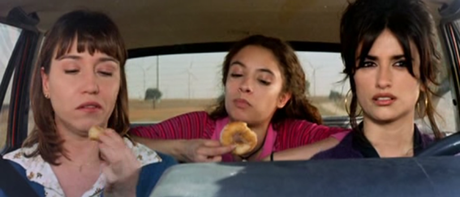
How do I even begin to describe Volver without giving too much away? For one, I definitely think most of the plot or the premise should be unknown prior to watching it. Then again, some basic knowledge of what the film is about should exist prior to watching it. The reason I say that is because halfway through Volver, I was wondering what the hell I was watching. I could not properly pigeonhole the film into a specific genre (the film is a mixture of so many!); I had no idea where it was going. I think some people would easily give up on the film as a result of this general confusion. Still, I loved what I'd seen so far, no matter my disorientation, and stuck it out till the end -- also because Mr. Rumsey at Mr. Rumsey's Film Related Musings recommended it so highly. After the credits started to roll, I seriously, dead ass was left mouth agape. How everything was tied together in the end is simply put mind-blowing. Few movies have left me as shocked as Volver and it's not necessarily the story (which is amazing in itself) but Almodovar's fantastic direction. This being only my second foray into the man's filmography after The Skin I Live In has already made of me a major and converted fan. That says a lot, no?
 What's it about, pussycat: Ok, first off, don't call me that. Second, fine. Volver is an exploration of a family of women and how they, and the women around them, deal with death and life's tragedies that lead up to it. The women are two sisters Raimunda and Soledad "Soli", Raimunda's daughter Paula, the sisters' deceased mother and aunt, their former neighbor Augustina, and the sisters' friends, neighbors, clients and acquaintances. No male character plays a major role in the film, though much of what happens to the women sometimes relates to men. The story also seems to be in a constant circular motion as much of what happened in the first generation of women reoccurs in the successive generations. History repeats itself. Furthermore, Almodovar showcases Spanish culture at its richest in all its superstitious splendor; people cleaning/decorating the tombs of the deceased, the dead coming back to life and watching over the living, and kisses. Boy, the kisses in this film. One of the things that really stuck out to me about the film is how women kiss each other once on each cheek when they see each other. This idiosyncrasy, along with many others, lend a sense of charm and authenticity to the film.
What's it about, pussycat: Ok, first off, don't call me that. Second, fine. Volver is an exploration of a family of women and how they, and the women around them, deal with death and life's tragedies that lead up to it. The women are two sisters Raimunda and Soledad "Soli", Raimunda's daughter Paula, the sisters' deceased mother and aunt, their former neighbor Augustina, and the sisters' friends, neighbors, clients and acquaintances. No male character plays a major role in the film, though much of what happens to the women sometimes relates to men. The story also seems to be in a constant circular motion as much of what happened in the first generation of women reoccurs in the successive generations. History repeats itself. Furthermore, Almodovar showcases Spanish culture at its richest in all its superstitious splendor; people cleaning/decorating the tombs of the deceased, the dead coming back to life and watching over the living, and kisses. Boy, the kisses in this film. One of the things that really stuck out to me about the film is how women kiss each other once on each cheek when they see each other. This idiosyncrasy, along with many others, lend a sense of charm and authenticity to the film.The cinematography is rich, and the story is so elaborate and just so damn good! I really wish I could talk about it more. So many twists and turns. Everything you believed up until the near end is overturned, and yet not really because when you look back it all makes sense and fits neatly into the puzzle delivered by Almodovar's wondrous mind. The acting in the film is also so strong. I was reminded of Cries And Whispers in that they both have a female-centered cast and there is not a weak performance in sight. I'm generally not a fan of Penelope Cruz, although I did love her in Vanilla Sky. But in this film, she killed her role as Raimunda. Cruz is able to bring out all of Raimunda's complexities. Such complexities are not explained. To Almodovar, the being cannot really be explained; that would be too categorical. It can however be given more depth and unveiled. And it is this unveiling that Cruz manages to accomplish through her character. She lays her character bare, showcasing her flaws and igniting her inner light. She gives life to the character.
 The other ladies are also on point. Lola Duenas does a job equally as amazing as Cruz given her almost thankless role as the dumpy sister. She shows us Soli's fragility and her drive to live. Carmen Maura and Yohana Cobo should also be commended, Maura especially given how she's mostly talked about during the film. She manages to embody everything said about her and yet show other facets to complete her character's humanness. Yet, the actress that almost stole the film from Cruz is to me no doubt Blanca Portillo. Her character of Augustina is already one of my favorites in the history of cinema. The character could have gone either two ways with a lesser actress: sappy or overtly nice. Portillo also manages to show different aspects to her character and she is the one I related to the most out of everybody in the film. I think all these multi-faceted performances go hand in hand with Almodovar/the film's themes of complexity. Almodovar shows us that in death the deceased can live anew. He shows us that life itself can even be affected by death's own complexities, perhaps not even in ways we would expect. Only in death can we begin to see and appreciate life, a key theme of the film I believe.
The other ladies are also on point. Lola Duenas does a job equally as amazing as Cruz given her almost thankless role as the dumpy sister. She shows us Soli's fragility and her drive to live. Carmen Maura and Yohana Cobo should also be commended, Maura especially given how she's mostly talked about during the film. She manages to embody everything said about her and yet show other facets to complete her character's humanness. Yet, the actress that almost stole the film from Cruz is to me no doubt Blanca Portillo. Her character of Augustina is already one of my favorites in the history of cinema. The character could have gone either two ways with a lesser actress: sappy or overtly nice. Portillo also manages to show different aspects to her character and she is the one I related to the most out of everybody in the film. I think all these multi-faceted performances go hand in hand with Almodovar/the film's themes of complexity. Almodovar shows us that in death the deceased can live anew. He shows us that life itself can even be affected by death's own complexities, perhaps not even in ways we would expect. Only in death can we begin to see and appreciate life, a key theme of the film I believe.In closing, Volver was so drastically different from The Skin I Live In. I would never have thought both came from the same director. Volver contains more key elements from different genres: humor, mystery, supernatural. The only similarities are the way in which the films' latter portions shed meaning on the earlier scenes. This is a film I would recommend to everybody, even people who do not really appreciate foreign films or only adhere to action movies. Because I feel Volver is a film celebrating life. It's very much a film about life. It has something for everybody in it. To sound either stupid or snobbish (the two can sometimes go hand in hand), Volver is real. Seriously, thank you Mr. Rumsey for encouraging me to see this one. Come time for my updating my movie list, this one's going to be ridiculously high.
Ludovico Rating

